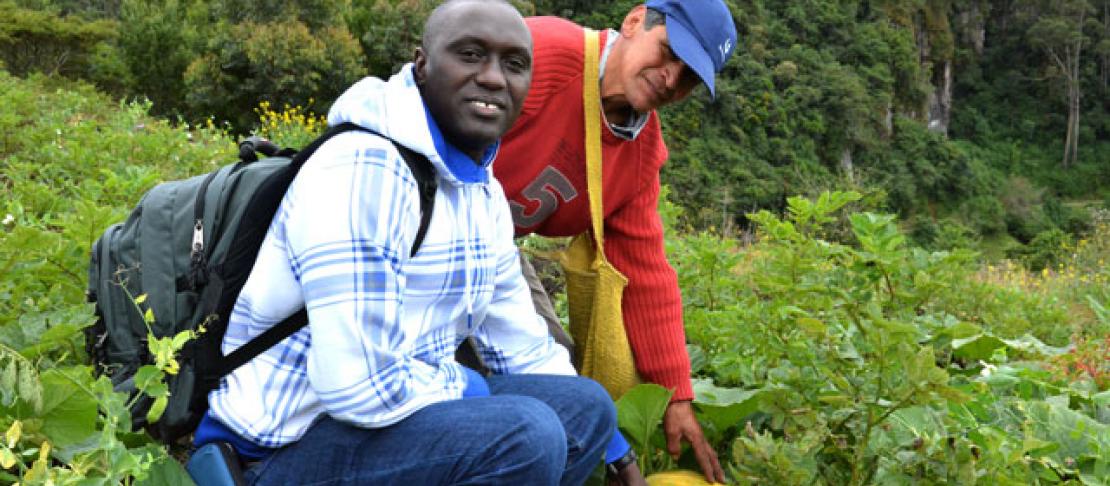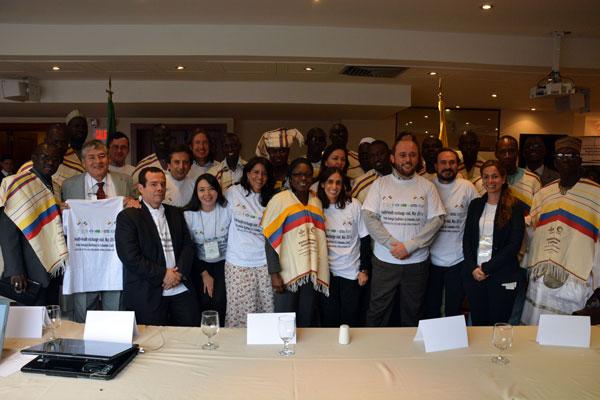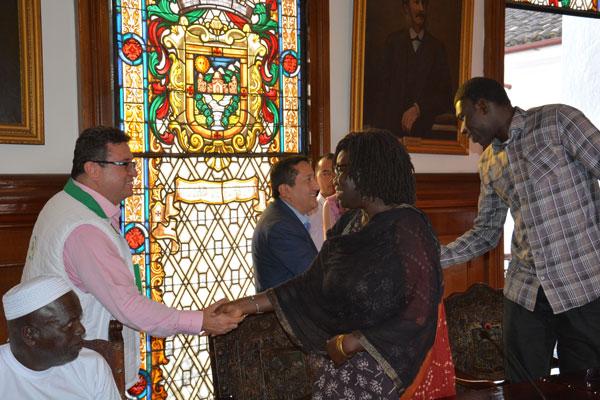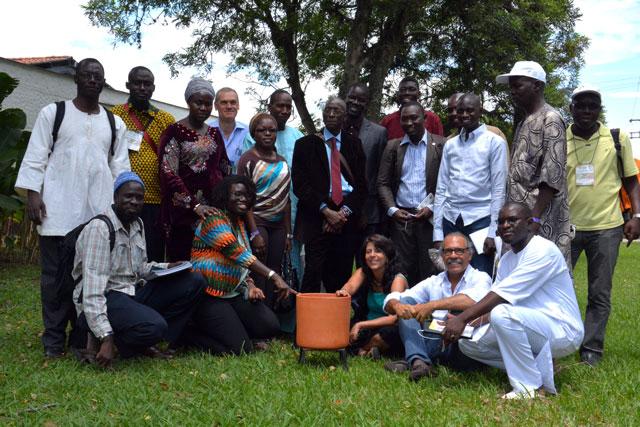Sowing unions to harvest hope: Senegal shares approaches with Colombia

A large Senegalese delegation was visiting Colombia for a week, sharing experiences and lessons learned in climate change, agriculture and food security, and strengthening the bond of cooperation between the two countries.
A journey over 24 hours from Senegal’s capital Dakar to Colombia there was a total of 16 delegates: members of the Ministry of Agriculture, the Presidential Council, the Parliament, local authorities, the meteorological agency of Senegal, research centers, extension services, as well as farmers who were active participants within the meeting hosted in Bogota, Cauca and Valle departments to share their experiences on improving agricultural production and to discuss how to tackle climate change.
This visit organized by the CGIAR Research Program on Climate Change, Agriculture, and Food Security (CCAFS) was in effort to strengthen the cooperation between Senegal and Colombia, both of which are facing similar challenges on issues such as climate variability, agriculture, and the challenge of feeding the growing population. This reunion was also an effort to continue the delegation initiated by Colombia within Senegal, in September 2013.
Learn more: Generating a climate conscience through south-south learning
In effort to continue the Colombian-Senegalian delegation established in 2013, the first meeting was held with Colombian counterparts: Representatives of the Ministries of Agriculture (MADR) and Environment (MADS), the Presidential Agency for Cooperation (APC), the Colombian Meteorological Institute (IDEAM), gremios of producers like Fedearroz and Fenalce, the National Planning Department (DNP), the Rural Agricultural Planning Unit (UPRA) and the Colombian Corporation of Agricultural Research (Corpoica).
This meeting, hosted over breakfast in Bogotá, was to welcome the exchange of previous and current developments within each country’s agricultural sector, as well as to share their challenges and successes towards ensuring food security and improving the livelihood of their rural communities.
The meeting began with presentations from each country followed by an open discussion to exchange enriching guidance and information. María del Mar Gutierrez, head of the Africa Desk of the APC, concluded that: “The exercise to share each other’s practices and lessons learned will serve everyone to scale up in the knowledge we have gained here and be able to share with other nations (…) Colombia’s government wants to not only strengthen the relationship with diplomats but also the technical ties with Senegal. This experience has helped us to create a framework for better communication between both countries to formulate a joint project between both governments; the inputs from this meeting will be transmitted to the Ministry of Foreign Affairs and the Embassy of Colombia concurrent to Senegal.”

PARTICIPANTS WITH GIFTS GIVEN BY BOTH DELEGATIONS.
The following day the meeting continued with a visit to the south of Colombia; the village of San Antonio, near the Santander de Quilichao of Cauca, to meet the Association for Rural Development of Northern Cauca (ARDECANC). There the participants learned about the cooperative model of work and also saw the process of transforming cassava into starch, known as ‘'rallandería'.
In return, the Senegalese delegation shared their agricultural challenges with climate change from their eight months of drought to their more irregular rain patterns. Furthermore, the Senegalese shared how in the last three years they have been trying to overcome these challenges by implementing successful and innovative agro-climate forecasts with the support from CCAFS and stakeholders involved: from senior government officials, agricultural extension services, cooperatives and farmers. This effort has made climate information more available for farmers and has successfully made great steps towards improving crop yields and benefiting food security.
View video: Our current work of climate information in Kaffrine, Senegal.
The session was further complemented with questions regarding Colombia’s 'quilichagüeños' (the name of the natives residing in the Cauca region) and understanding the similarities between both countries’ agricultural practices and cultural origins.
The meeting continued via visit to Popayan (also known as the ‘white city’), the capital of the Cauca, where Mayor Francisco Fuentes Meneses welcomed the delegates with gifts, music and a warm greeting when he said, “What continues to bind as closer is through our efforts to combat climate change and food security. Every nation in the world has its difficulties, especially relating to climate change and agriculture production. That is why it is important we share our experiences together in order to improve our quality of life”.

AUTHORITIES of Popayan, Cauca RECEIVED the senegalese DELEGATION
The next day, the delegation continued its journey to the indigenous council of the municipality of Puracé where the Senegalese delegates were delighted to dance in rhythm with the shawm and drum. This experience made the delegates feel very much at home, making them forget they were at 2,850 meters above sea level and away from home.
Additionally, the Senegalese delegates were also delighted to learn about the large variety of fruits and vegetables produced by the local natives. The production of these fruits and vegetables were cultivated with organic fertilizers and pesticide usage. The native farmer’s pride in producing more natural and organic produce urged the Senegalese to see the ‘seed bank’ located at the International Center for Tropical Agriculture (CAIT) in Palmira.
While at CIAT’s Seed Bank the Senegalese brought Baobab seeds as a friendship-gift to be planted at CIAT. The Baobab seed symbolizes the Senegalese-Colombian’s growing partnership, since the Baobab seed grows into a large, durable and strong tree which is highly respected within Senegalese culture.

PLANTING THE SEED OF BAOBAB, SYMBOL OF this EXCHANGE
Finally, the Senegalese delegates’ visit ended with a visit to the ‘The Hatico’ in the town of El Cerrito. The visit to El Cerrito was important because of its sustainable and commercial agriculture production that has been recognized for its contribution towards sustainable development and ecosystem conservation in the region, which has been recognized by the Colombian Network of nature Reserves of Civil Society.
After a six day visit, 24 hour plane ride, and traveling over 500 km by road to visit several regions in Colombia, sharing countless of experiences and learning together with smiles and conversations has become the fertilizer that will strengthen the Colombian-Senegalese bilateral cooperation; symbolizing the growth of the strong and robust Baobab tree.
See the pictures of the visit in this photostory
José Luis Urrea is Communications Officer for CCAFS Latin America.
Edited by Chelsea Cervantes de Blois, CIAT Visiting Researcher



